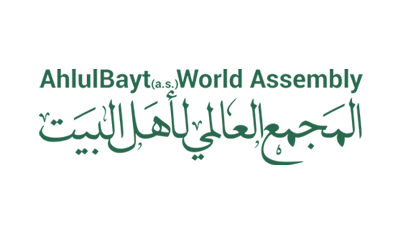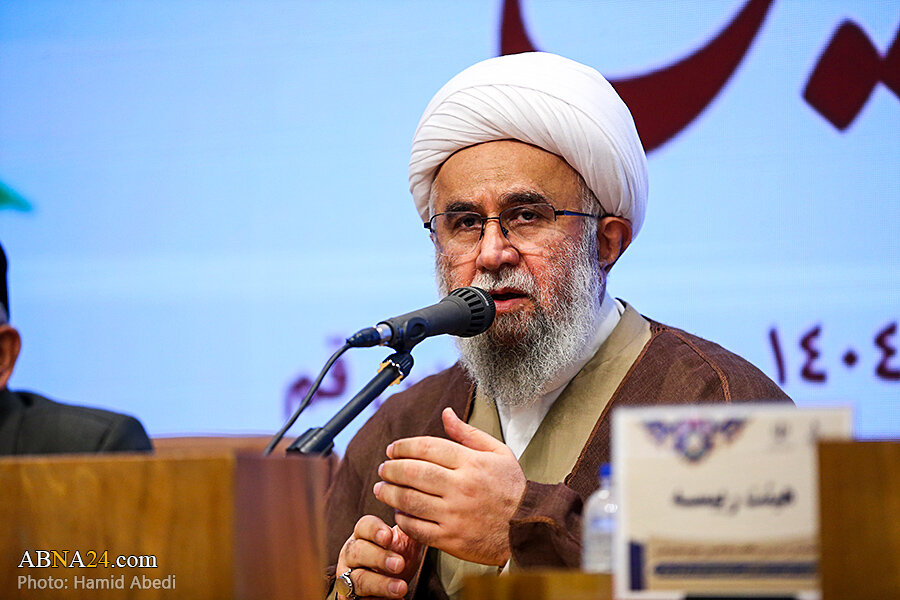Qom Seminary Has the Capacity for Islamic Civilization-Building / The Islamic Revolution Changed Global Equations
Ayatollah Ramazani, Secretary-General of the AhlulBayt (a.s.) World Assembly stated, “Today, an exceptional and unprecedented opportunity has been placed at the disposal of Islamic seminaries. We must be able to introduce Islam to the world using international discourse, and we will certainly succeed in this path.”
At the conference “Seminary and International Affairs,” held at the Imam Kazem (a.s.) Seminary in Qom with the presence of prominent scholars and intellectuals from various countries, Ayatollah Reza Ramazani, Secretary-General of the AhlulBayt (a.s.) World Assembly delivered a speech.
Elaborating on Islam’s epistemological and civilizational dimensions, he stated, “In Islam, there are two affirmative principles and two prohibitive principles that encompass the whole Islamic teachings. The two affirmative principles are dignity, in all its existential aspects, and justice. Unlike the Western view that sees dignity as a reactive matter, Islam defines dignity as proactive. In the realm of social transformations as well, the affirmative principle is justice, which has been the ideal of all divine prophets (a.s.) and is considered a Fitri matter (rooted in Fitrah – human innate divine nature).”
Ayatollah Ramazani added, “The two prohibitive principles in Islam are: avoiding oppression, and submitting to oppression. These two principles must also be properly explained, and the misconceptions surrounding them addressed.”
Speaking about the two historical approaches to religion, he remarked, “One of these approaches has been the removal of religion, and the other, its restriction. During the Renaissance, revelatory intellect was dismissed and replaced by self-reliant reason to the point that reason stood in opposition to religion. In the former Soviet Union, there was a seventy-year effort to eliminate religion. And today, Western systems are seeking to restrict religion. Yet despite all these efforts, we are now witnessing a widespread return to religion, even in academic environments, which demonstrates the failure of the project to eliminate religion.”
Emphasizing the impact of the Islamic Revolution of Iran, Ayatollah Ramazani said, “After the victory of the Islamic Revolution, Muslims found the greatest historical opportunity they had ever had. Before the Islamic Revolution of Iran, some believed that a religious revolution in the world was no longer possible, and that if a revolution did occur, it would either be secular or laic. However, the Islamic Revolution of Iran, under the leadership of Imam Khomeini (r.a.), proved this notion false and brought about a miracle that disrupted global equations. Thus, the only force that was able to emerge globally with substantial content and stand against the hegemonic system was Islam.”
He continued, “Today, an exceptional and unprecedented opportunity has been granted to the seminaries. We must be able to introduce Islam to the world using international language and discourse, and we will undoubtedly succeed in this path. The West is currently facing serious crises in thought, ideology, and practice. In the economic domain, ninety percent of the world’s wealth is in the hands of less than ten percent of the population, while two billion people suffer from malnutrition. This is the very economic justice that modernity had promised but failed to deliver.”
Emphasizing the necessity of utilizing the potential of cyberspace to introduce Islam, Ayatollah Ramazani stated, “Today, both the beauty and the majesty of religion are being revealed, but at the same time, we are faced with serious distortions. In the West, there are efforts to create a liberal version of Islam. Some intellectuals, even within Islamic countries, are proposing the removal of verses about jihad from the Quran, despite the fact that these verses were revealed to confront the arrogant powers and are defined within the framework of divine mercy.”
He continued, “On the other hand, Takfiri Islam has emerged in recent decades to create Islamophobia. Seminaries must take a stance against such distortions. If in the past the Umayyads and the Abbasids distorted religion, today this distortion occurs under labels such as ‘merciful Islam,’ ‘liberal Islam,’ and ‘Takfiri Islam.’ The seminary must train individuals capable of introducing the comprehensive Islam to the international arena.”
Referring to the message of the Supreme Leader on the occasion of the centenary of the reestablishment of the Qom Seminary, the Secretary-General of the AhlulBayt (a.s.) World Assembly said, “In this message, two key concepts were emphasized: ‘Ummah-building jurisprudence’ and ‘civilization-building Islam.’ We must utilize the opportunities created after the Islamic Revolution, and seminary scholars must competently present Islam on the global stage. Undoubtedly, in the field of thought and action, victory will be ours.”
While warning about new distortions emerging in the West, he added, “In some countries, prayer services initially begin with English translations, and after a while, the Arabic version is entirely removed. Eliminating the Resistance movement from Islamic teachings, as well as ignoring the merciful dimension of religion, are among other aspects of these distortions. Another threat is the exclusive focus on either esotericism or, conversely, literalism, which leads to the elimination of the social and political dimensions of religion.”
Concluding his remarks, Ayatollah Ramazani emphasized, “The seminary must make a serious return to the essence of religion (Islam) and incorporate all its existential dimensions into its educational and research programs. The Quran also acknowledges this comprehensiveness. Jurisprudence is not the entirety of religion; religion possesses other crucial dimensions such as ethics and beliefs, which must be given special attention in order to strengthen the foundation of the faithful individual.”
Ayatollah Ramazani, Secretary-General of the AhlulBayt (a.s.) World Assembly stated, “Today, an exceptional and unprecedented opportunity has been placed at the disposal of Islamic seminaries. We must be able to introduce Islam to the world using international discourse, and we will certainly succeed in this path.”
At the conference “Seminary and International Affairs,” held at the Imam Kazem (a.s.) Seminary in Qom with the presence of prominent scholars and intellectuals from various countries, Ayatollah Reza Ramazani, Secretary-General of the AhlulBayt (a.s.) World Assembly delivered a speech.
Elaborating on Islam’s epistemological and civilizational dimensions, he stated, “In Islam, there are two affirmative principles and two prohibitive principles that encompass the whole Islamic teachings. The two affirmative principles are dignity, in all its existential aspects, and justice. Unlike the Western view that sees dignity as a reactive matter, Islam defines dignity as proactive. In the realm of social transformations as well, the affirmative principle is justice, which has been the ideal of all divine prophets (a.s.) and is considered a Fitri matter (rooted in Fitrah – human innate divine nature).”
Ayatollah Ramazani added, “The two prohibitive principles in Islam are: avoiding oppression, and submitting to oppression. These two principles must also be properly explained, and the misconceptions surrounding them addressed.”
Speaking about the two historical approaches to religion, he remarked, “One of these approaches has been the removal of religion, and the other, its restriction. During the Renaissance, revelatory intellect was dismissed and replaced by self-reliant reason to the point that reason stood in opposition to religion. In the former Soviet Union, there was a seventy-year effort to eliminate religion. And today, Western systems are seeking to restrict religion. Yet despite all these efforts, we are now witnessing a widespread return to religion, even in academic environments, which demonstrates the failure of the project to eliminate religion.”
Emphasizing the impact of the Islamic Revolution of Iran, Ayatollah Ramazani said, “After the victory of the Islamic Revolution, Muslims found the greatest historical opportunity they had ever had. Before the Islamic Revolution of Iran, some believed that a religious revolution in the world was no longer possible, and that if a revolution did occur, it would either be secular or laic. However, the Islamic Revolution of Iran, under the leadership of Imam Khomeini (r.a.), proved this notion false and brought about a miracle that disrupted global equations. Thus, the only force that was able to emerge globally with substantial content and stand against the hegemonic system was Islam.”
He continued, “Today, an exceptional and unprecedented opportunity has been granted to the seminaries. We must be able to introduce Islam to the world using international language and discourse, and we will undoubtedly succeed in this path. The West is currently facing serious crises in thought, ideology, and practice. In the economic domain, ninety percent of the world’s wealth is in the hands of less than ten percent of the population, while two billion people suffer from malnutrition. This is the very economic justice that modernity had promised but failed to deliver.”
Emphasizing the necessity of utilizing the potential of cyberspace to introduce Islam, Ayatollah Ramazani stated, “Today, both the beauty and the majesty of religion are being revealed, but at the same time, we are faced with serious distortions. In the West, there are efforts to create a liberal version of Islam. Some intellectuals, even within Islamic countries, are proposing the removal of verses about jihad from the Quran, despite the fact that these verses were revealed to confront the arrogant powers and are defined within the framework of divine mercy.”
He continued, “On the other hand, Takfiri Islam has emerged in recent decades to create Islamophobia. Seminaries must take a stance against such distortions. If in the past the Umayyads and the Abbasids distorted religion, today this distortion occurs under labels such as ‘merciful Islam,’ ‘liberal Islam,’ and ‘Takfiri Islam.’ The seminary must train individuals capable of introducing the comprehensive Islam to the international arena.”
Referring to the message of the Supreme Leader on the occasion of the centenary of the reestablishment of the Qom Seminary, the Secretary-General of the AhlulBayt (a.s.) World Assembly said, “In this message, two key concepts were emphasized: ‘Ummah-building jurisprudence’ and ‘civilization-building Islam.’ We must utilize the opportunities created after the Islamic Revolution, and seminary scholars must competently present Islam on the global stage. Undoubtedly, in the field of thought and action, victory will be ours.”
While warning about new distortions emerging in the West, he added, “In some countries, prayer services initially begin with English translations, and after a while, the Arabic version is entirely removed. Eliminating the Resistance movement from Islamic teachings, as well as ignoring the merciful dimension of religion, are among other aspects of these distortions. Another threat is the exclusive focus on either esotericism or, conversely, literalism, which leads to the elimination of the social and political dimensions of religion.”
Concluding his remarks, Ayatollah Ramazani emphasized, “The seminary must make a serious return to the essence of religion (Islam) and incorporate all its existential dimensions into its educational and research programs. The Quran also acknowledges this comprehensiveness. Jurisprudence is not the entirety of religion; religion possesses other crucial dimensions such as ethics and beliefs, which must be given special attention in order to strengthen the foundation of the faithful individual.”






